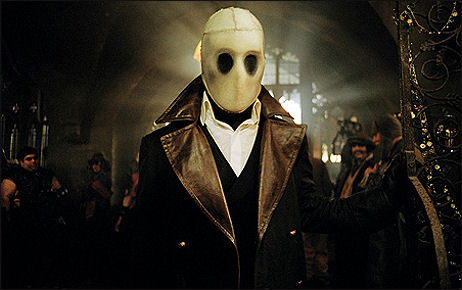Franklyn: "If you believe in something strongly enough, who is to say whether it's real or not?"
 Franklyn is a British film that is set between the parallel realities of modern-day London and a futuristic metropolis called Meanwhile City. The theme of the film is an examination of the link between reality and perceptions of reality.
Franklyn is a British film that is set between the parallel realities of modern-day London and a futuristic metropolis called Meanwhile City. The theme of the film is an examination of the link between reality and perceptions of reality.
The movie traces the lives of four people. Jonathan Preest is a masked vigilante of Meanwhile City (where he is the only atheist) - and he won't rest until he finds his nemesis, a religious leader known only as 'The Individual'. Emilia is a troubled young art student whose artwork mixes reality and hyper-reality. Milo is a jilted man who yearns for love. Peter is a man steeped in religion, searching desperately for his missing son amongst London's homeless. In the final scenes of the film, their lives dramatically coincide.
Although I enjoyed this film, its low-budget clearly showed. The acting was okay - although I was perhaps distracted by the fact that several of the actors are better known for roles on the small screen. Expect to see actors who've cut their teeth in The Bill, Life on Mars and Cracker. Bernard Hill (who was our next door neighbour once upon a time) was the standard actor, playing the character of Peter admirably.
The movie examines the relationship between perceptions of reality and 'reality' itself. Emilia's art blurs the distinction between her art and real life. Religious belief, psychosis and wish-fulfilment portrayed as other examples of when a perception of reality drives an individual so that they are not engaging with 'reality' at all. Hence the most powerful line of the film, spoken by Emilia, which is in the post title.
There's no doubt that this idea has some truth in it. In fact, I wondered whether the film really took this idea far enough - implying, as it did, that there are some who operate in life with no such filter - as if an atheistic, well-rounded, psychologically healthy person engages with reality alone. An so, according to the film, to recognise our psychological crutches and filters is to do away with them. But this is somewhat simplistic. Postmodern theorists have rightly shown us that each of us has only a shard's view of reality - we can't claim to see everything ourselves. It seems to me that the best way of thinking about life is the position of 'critical realism' - that there really is a real world, but that for all of us our cultural baggage and experiences affect how we live in it.


No comments:
Post a Comment